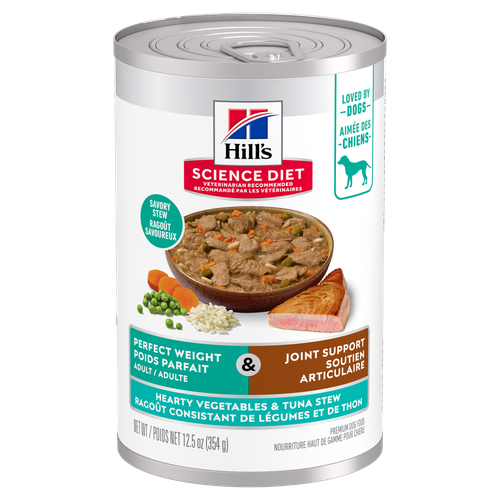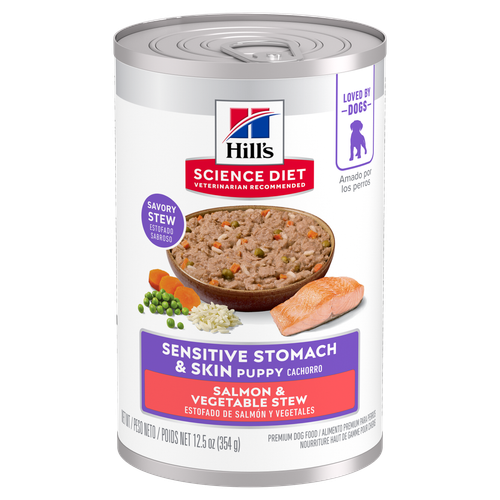
-
Find the right food for your petTake this quiz to see which food may be the best for your furry friend.Find the right food for your petTake this quiz to see which food may be the best for your furry friend.Featured products
 Adult Perfect Weight & Joint Support Hearty Vegetables and Tuna Stew Dog FoodShop Now
Adult Perfect Weight & Joint Support Hearty Vegetables and Tuna Stew Dog FoodShop Now Healthy Cuisine, Adulte, assortiment de conserves
Healthy Cuisine, Adulte, assortiment de conservesHill's Science Diet Healthy Cuisine Variety Pack
Shop Now Sensitive Stomach & Skin, assortiment de conserves
Sensitive Stomach & Skin, assortiment de conservesHill's Science Diet Sensitive Stomach & Skin Variety Pack
Shop NowFeatured products Perfect Weight Salmon & Vegetable Canned Cat Food
Perfect Weight Salmon & Vegetable Canned Cat FoodOver 70% of cats lost weight within 10 weeks when fed this nutrition
Shop Now Adult Chicken & Spinach Casserole Cat Food
Adult Chicken & Spinach Casserole Cat FoodWith delicious chunks in a decadent gravy
Shop Now Adult 7+ Tender Chicken Dinner Cat Food
Adult 7+ Tender Chicken Dinner Cat FoodWith delicious chunks in a decadent gravy
Shop Now -
Dog
- Dog Tips & Articles
-
Health Category
- Weight
- Food & Environmental Sensitivities
- Urinary
- Digestive
- Joint
- Kidney
- Dental
- Cancer
-
Life Stage
- Puppy Nutrition
- Adult Nutrition
- Senior Nutrition
Cat- Cat Tips & Articles
-
Health Category
- Weight
- Skin & Food Sensitivities
- Urinary
- Digestive
- Kidney
- Dental
- Stress
- Cancer
-
Life Stage
- Kitten Nutrition
- Adult Nutrition
Featured articles Compare Your Pet Food's Calories to Other Brands
Compare Your Pet Food's Calories to Other BrandsCompare Hill's Science Diet dog and cat food's calories against other pet food brands and AAFCO recommended maximum calorie count.
Read More Pet Food Storage Tips
Pet Food Storage TipsDiscover how and where to store your dry, as well as canned, dog and cat food. Learn how to find the "best before" dates on all Hill's pet food packaging.
Read More The Incredible Science Behind Your Pet's Microbiome
The Incredible Science Behind Your Pet's MicrobiomeLearn what a pet's microbiome is, how it contributes to your pet's gut & overall health, and why nutrition is important in maintaining healthy microbiomes.
Read More -


Is your dog vomiting after eating? When a dog throws up recently eaten food, you're rightfully concerned, but there are a few things that could be bothering his stomach.
First, cover the basics: Have you made changes to your dog's nutrition recently? Does he compete with other pets for food? Has he recently eaten grass? These are all possible reasons his stomach doesn't agree with him after dinner. Find out why they may make your dog sick and when you should bring him to the veterinarian.
Transitioning to a New Dog Food
Sudden changes to your dog's food may result in gastrointestinal issues, so switching dog food (varieties or brands) too quickly can upset his stomach. Above all, it's important to transition to a new dog food slowly, typically over 7-10 days. Before you make the decision to change dog foods, check with your veterinarian. If you continue to see signs of stomach issues or your dog does not stop vomiting, you should bring him in as soon as you can. He may have an allergy or food intolerance, or he may have a more serious problem (foreign body in the stomach, systemic disease, etc.).
If you've recently begun the transition to a Hill's® brand food, be sure to start small and gradually build up the amount until it's the only food you're only offering.
Quick Eating due to Anxiety
Although most pet parents assume that a dog vomiting after eating may have a sensitivity to the food, it isn't necessarily the case. Anxiety or fear may be the driving force to why a dog throws up after eating. Does your dog compete with other dogs in the house for food? This sense of territory can make him eat faster, which may overload his stomach and decrease the amount of saliva normally swallowed with the food that acts as a buffer. And just like us, nervousness and stress can make your dog feel queasy and increase acid in his stomach.
When dogs eat too quickly, they don't take the time to chew their larger pieces of kibble. They also ingest a significant amount of air, both of which can come back up by regurgitation or by vomiting. If possible, feed your anxious dog in a secluded area, without any other animals around. Start with small meals and gradually build back up to a normal-sized dinner once you see he's calmed down at each meal.

There can be other underlying issues associated with a dog's anxiety that can affect his ability to keep his food down. Have there been changes in the house that might have disrupted his routine? Have you moved lately or changed your work schedule? Changes like this can make your dog anxious, which can affect his digestive system. If you suspect that something like this could be why your dog is throwing up after eating, continue to show him you love him. Give him praise, pet and play with him, and reassure him that everything is okay. Slowly, over time he will adapt to the changes and get back to his old self. It is still important to monitor his eating habits to make sure that there isn't a larger issue at hand–if it is happening more than once every few weeks, you should consult your veterinarian. Vomiting due to other health concerns is more common than due to anxiety.


Tasty Tips
He Loves the Taste
Similar to anxiety eating, your dog may indulge too fast if he loves the taste of his food. There's nothing wrong with enjoying a meal, but you want to be sure your dog gets all the nutrition he can get without it coming back up.
One way to reduce this tendency is by feeding him smaller portions until you notice his intake naturally slows down. Another option is to serve your dog's meals spread out on a large flat plate or cookie sheet. This forces him to take longer to locate and ingest each piece, reducing the chances of him vomiting after eating. There are also special dog food puzzle toys that require him to work a little harder to get his food out. This can be good exercise for him, but also force him to eat more slowly. Just be sure to monitor that he is still eating all of his food, and doesn't get frustrated by his new meal delivery system.
He Recently Ingested Grass
While dogs may eat grass for a variety of reasons with no adverse effects, dogs that aren't feeling well for other reasons may eat grass and vomit their stomach contents, possibly removing whatever may have made them sick. Once your dog vomits the grass and food, he should feel better and shouldn't need any additional medical care if just a simple upset stomach. Just remember to keep your dog hydrated and watch him closely to ensure vomiting doesn't persist, and there is nothing else is wrong with him.
If your dog simply cannot stop vomiting after eating food and grass, bring him to the vet or emergency animal clinic as soon as possible. There could be something else wrong. He may have infectious or systemic disease, he may have a foreign body or even a twisted stomach. Whatever the case, quick attention will make him feel better.


Erin Ollila believes in the power of words and how a message can inform—and even transform—its intended audience. Her writing can be found all over the internet and in print, and includes interviews, ghostwriting, blog posts, and creative nonfiction. Erin is a geek for SEO and all things social media. She graduated from Fairfield University with an M.F.A. in Creative Writing. Reach out to her on Twitter @ReinventingErin or learn more about her at http://erinollila.com.
Related products

Hill's Science Diet Sensitive Stomach & Skin Variety Pack

Gentle on stomachs while nourishing skin & supporting development in growing puppies


Hill's Science Diet Healthy Cuisine Variety Pack
Related articles

Gather the following puppy supplies to prepare your family for all the fun (and commitment) that comes with being a dog parent.

Proper nutrition for your pregnant or nursing dog is vital to her and her puppy's health. Learn what you should do provide her with the proper nutrients.

Discover fun and engaging games and other ways to help your dog exercise, keeping him happy and healthy.

Learn how to stop your dog from begging at the dinner table, and understand how it can help contribute to his health.

Put your dog on a diet without them knowing
Our low calorie formula helps you control your dog's weight. It's packed with high-quality protein for building lean muscles, and made with purposeful ingredients for a flavorful, nutritious meal. Clinically proven antioxidants, Vitamin C+E, help promote a healthy immune system.
Put your dog on a diet without them knowing
Our low calorie formula helps you control your dog's weight. It's packed with high-quality protein for building lean muscles, and made with purposeful ingredients for a flavorful, nutritious meal. Clinically proven antioxidants, Vitamin C+E, help promote a healthy immune system.


